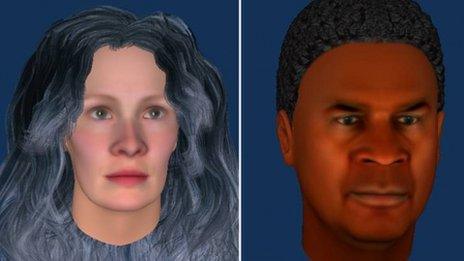Could avatar therapy succeed where drugs alone have failed?
- Published
- comments

A surprising way of helping schizophrenic patients deal with the voices in their heads has emerged and is about undergo a clinical trial.
"You're a thicko."
It's not quite the way you expect a psychiatrist to address his schizophrenic patient, but then avatar therapy is no ordinary treatment.
Prof Leff: The avatar gradually loses its horrible character
Pioneered by University College London's Professor Julian Leff, the idea involves using sophisticated computer graphics to create a realistic model, or avatar, of the voice inside a patient's head. They're then encouraged to take part in a series of three-way video conference sessions in which the therapist plays both himself, encouraging the patient to stick up for themselves and confront the voice, and the voice itself.
"Initially the avatar says the horrible things they hear every day," says Professor Leff, "but over the course of these sessions I encourage the patient to challenge the voice, and because I'm also controlling the avatar I allow them to win it over, so that it becomes warm and supportive. The really interesting thing is that the patient seems to accept that, and instead of being the victim of the voice becomes the master of it."
The key is to create a realistic avatar to represent the voice. Dr Geoff Williams from UCL's Department of Speech, Hearing and Phonetic Sciences uses a range of sophisticated computer gaming programmes to build a three dimensional model of the hallucination, much as the police would construct a photo-fit picture of a suspect.
"Often the hallucinations are based on real people," he says, "someone from their past, maybe an abuser. We can get very good likenesses using the latest graphics software. Sometimes they're so good they're hard for the person to look at."
But not all schizophrenics have a clear visual image of their persecutor - for many the voice itself is crucial. Along the corridor at UCL Dr Mark Huckvale uses a range of pitch and tone adjustments to match the therapists voice to the hallucination.
"There's a whole range of changes we can make from very basic alterations in pitch, making a voice higher or lower. Then we can fine tune a voice making more sophisticated changes, so we can morph it into a woman's voice, or make it colder and harder."
"Amazing" results
The voice chosen by Claire (not her real name) was as sinister and threatening as she could make it. "It was demonic really, but very realistic. So it was hard to listen to at first. I find confronting things difficult at the best of times, but it helped me to challenge the voice."
One of 26 people to take part in the original avatar study Claire had suffered from auditory hallucinations for more than a decade. "It gave me the strength to say no," she says, "I could tell the voices to stop, to leave me alone, and pretty much they have".
Three of the participants, including Claire, stopped hearing voices all together, and almost all those who completed the course of six sessions reported that the frequency and severity, or stridency, of the voices they heard had been significantly reduced - an astonishing achievement in an area of mental health where progress has been stalled for many years.
The challenge now is to see whether that success can be replicated in the everyday setting of NHS mental health services.
A task that falls to Professor Tom Craig from King's College London's Institute of Psychiatry. With the help of a £1.3 million Translation Award from the Wellcome Trust he's recruiting more than 140 schizophrenic patients to take part in a much bigger clinical trial.
"The results are amazing," he says. "But the question is if we roll this out in an ordinary NHS setting with really substantial numbers of patients can we replicate these findings?"
Certainly if Claire's experience is anything to go by avatar therapy promises to make a significant difference in the lives of many suffering from schizophrenia.
"Life's certainly a lot easier. I've stopped self-harming, which I did do because the voice was so infuriating. So yes, it's helped a lot".